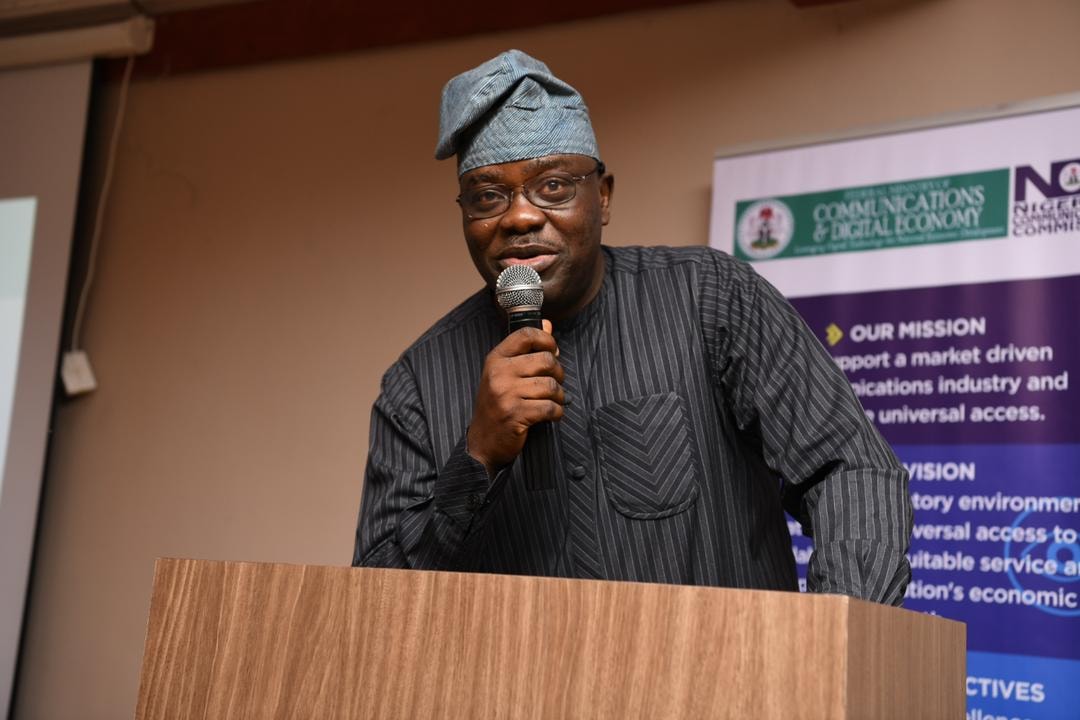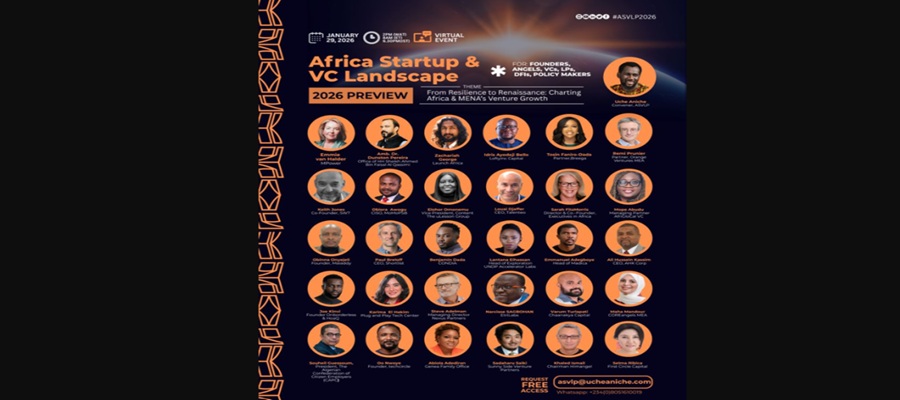Telecom
Akande Tasks Telecom Operators on Licensing Obligations

Prof. Adeolu Akande, Chairman, Board of Commissioners of the Nigerian Communications Commission (NCC), has urged telecoms licensees across different segments of the Nigerian telecommunications sector on the need to adhere strictly to their licensing obligations in order to ensure robust provision of services to the consumers.

Prof. Adeolu Akande, Chairman NCC Board, contributing to the forum
Akande made the call in his remark at the third edition of NCC’s 2021 “Talk to The Regulator” (TTTR) Forum, which took place at Visa Karena Hotels, Port Harcourt, over the weekend.
At the forum held with a focus on “Improving Stakeholder Satisfaction”, Akande stated that the essence of conducting the stakeholder engagement forum across the country’s geo-political zones was to demonstrate to the Commission’s licensees that responsibility does not end in issuing of licenses alone but rather in working with the licensing authority to address issues affecting their operations.
Beyond the issuance of licences to operators, Akande declared that the Commission is legitimately concerned with providing the necessary regulatory frameworks and initiatives capable of ushering in an environment that encourages seamless implementation of the licence conditions.
“In return, we expect the licensees to deliver on their licensing conditions and I want to use this opportunity to challenge our licensees to always comply with their licensing obligations and conditions in order to provide the much-needed services to the generality of Nigerians,” he said.
Speaking earlier on the centrality of the stakeholder engagement to the regulatory activities of the Commission, Prof. Umar Garba Danbatta, Executive Vice Chairman and Chief Executive Officer (EVC/CEO), said the Commission considers feedback from stakeholder’s engagement initiatives imperative for building a robust licensing regime in the Nigerian telecom sector.
The EVC, who was represented at the forum by Adeleke Adewolu, Executive Commissioner, Stakeholder Management, reiterated the Commission’s commitment to stakeholder engagement as a means of deepening collaboration with NCC’s licensees, identifying areas of concern, and jointly developing and implementing practical solutions.
The NCC boss noted that the focus of deliberations for the series of stakeholder engagement had been on licensing processes, policies, and procedures, all geared towards improving Stakeholder Satisfaction, a central factor to all NCC’s regulatory activities.
He emphasised the need to curate insights from each geo-political zone to encourage mutually-beneficial relationships and enhance understanding between the Commission and its key stakeholders.
According to Danbatta, measurable success has been recorded essentially because of Commission’s focus on prioritising stakeholders.
“Achievements such as contributions to Gross Domestic product (GDP) grew to 14.42 per cent in Q2’2021; active internet subscriptions have reached over 140 million; teledensity which now stands at 99.98 per cent; and 40.01% per cent broadband penetration, all as at the end of September, 2021,” he said.
Speaking further, Danbatta said to achieve national policy targets and maintain progressive growth in the telecoms industry, “efforts must be jointly made to harness the full cooperation of licensees to highlight areas hampering the progress of the Commission’s stakeholders.
“We have started making necessary adjustments to reflect the views of our licensees in Kano and Lagos. Port Harcourt will not be an exception,” Danbatta assured.
He reiterated that the meeting is organised in keeping with the Commission’s strategic objectives, which seek to guarantee continuous interface with the critical stakeholder in the industry, for collaboration in seeking solutions to challenges of licensing in Nigeria.
Further underscoring the significance of stakeholder engagement and sensitisation in the Commission, Danbatta said the forum affords stakeholders a platform to raise questions about the challenges of licensing and their operations.
He said such forum also avails the Commission ample opportunity to adequately respond to the concerns that may be raised.
At the Focus Group Discussions (FGD), participants reviewed and discussed licensing trends, regulatory process, implementation of Annual Operating Levy (AOL) regulations, assigning of short codes, type-approval obligations, and Commission’s expectations.
Commission’s propositions for the survival of smaller licensees were also discussed in a session termed “Listen to the licensee,” as they were not only given ample time to air their grievances but also made to proffer solutions for Management’s consideration.
Also, mutually-beneficial positions on multiple taxations, surrendered licences, Right-of-way (RoW) for Internet Service Providers (ISPs), Global System for Mobile Communications (GSM) boosters, amongst others, were part of the issues discussed.
The Port Harcourt edition of the TTTR was sequel to previous editions of the stakeholder engagement forum which took place in Kano on October 16, 2021 and Lagos on November 25, 2021.
The event had in attendance members of NCC Board: Prof. Millionaire Abowei; Clement Baiye; Chief Uche Onwude; as well as Director, Technical Standards and Network Integrity, Bako Wakil; and his counterpart in Licensing and Authorisation, Muhammed Babajika, whose department facilitated the organisation of the forum.
Telecom
ASVLP 2026: Africa, MENA VCs Gear Up as Tech Funding Hits $4.1bn Rebound

As Africa and MENA’s startup ecosystems transition from post-correction resilience into a new phase of disciplined growth, the Africa Startup & VC Landscape Preview (ASVLP 2026) will convene leading founders, investors, policymakers, and ecosystem builders on January 29, 2026, for its second annual, agenda-setting virtual forum.

Following a challenging global venture cycle, 2025 marked a notable rebound across the African ecosystem, with startups raising an estimated $3.2–$3.3 billion over the full year.
The recovery was accompanied by significant structural shifts: Kenya emerged as the leading destination among Africa’s “Big Four” markets for the first time, while Nigeria recorded a year-on-year funding decline, reflecting changing investor preferences, macroeconomic pressures, and a broader recalibration toward capital efficiency and sustainability.
Sectorally, fintech remained the most funded vertical, while climate & energy, AI-enabled solutions, healthtech, and infrastructure-adjacent businesses gained increasing attention. Across Africa and MENA, development finance institutions (DFIs) and family offices played a more pronounced role in anchoring funds, deploying catalytic capital, and supporting blended-finance structures, reshaping how early-stage and growth capital is mobilized.
ASVLP 2026 is designed to translate these data points into forward-looking strategy.
The forum will bring together venture capitalists, angel investors, LPs, DFIs, family offices, founders, corporate leaders, and regulators from Africa, MENA, Europe, and North America to assess 2025 outcomes and chart priorities for 2026.
The program will feature keynotes, fireside chats, panels, and deep-dive roundtables, including discussions on:
· The 2026 Africa & MENA FinTech Landscape, focusing on security, profitability, regulation, and growth frontiers
· Emerging Fund Managers, capital formation, and LP alignment
· Talent, operator depth, and institutional capacity as constraints to scale
· Regulatory evolution and cross-border market integration
A major highlight of ASVLP 2026 will be the Final DealRoom Pitch Session, where a curated group of high-potential startups will present to an experienced panel of investors.
• Founders can apply to pitch via: bit.ly/ASVLP-DR-Founders
• Investors seeking DealRoom access can request entry via: bit.ly/ASVLP-DR-Investors
Confirmed speakers for ASVLP 2026 include Khaled Ismail (HIMangel), Idris Ayodeji Bello (LoftyInc Capital), Zachariah George (Launch Africa), Tosin Faniro-Dada (Breega), Selma Ribica (FirstCircle Capital), Maha Mandour (COREangels MEA), Joe Kinvi (Borderless), Remi Prunier (Orange Ventures MEA), Karima El Hakim (Plug and Play Tech Center), Souheil Guessoum (President, The Confederation of Citizen Employers – Algeria (CAPC)), Remi Prunier (Partner, Orange Ventures, MEA), Maha Mandour (COREAngels MEA), Ali Hussein (President, Kenyan FinTech Association), Patrick Okebu (CIO, Interswitch Group) among other leading voices shaping capital, policy, and innovation across the region.
“The conversation has shifted,” said Uche Aniche, Convener of ASVLP. “It’s no longer about whether capital will return to Africa and MENA, but what kind of capital, deployed with what discipline, and in service of which long-term outcomes. ASVLP exists to help the ecosystem make sense of that transition.”
Participation in ASVLP 2026 is free but strictly by invitation.
Interested participants are encouraged to repost the official announcement on LinkedIn and comment #ASVLP2026 to receive a private registration link. They could also email [email protected] and request invite.
Telecom
TikTok, Instagram Blamed in US Youth Suicide Lawsuit

Major social media giants Meta Platforms, TikTok and Alphabet’s YouTube will face a landmark jury trial this week in Los Angeles County Superior Court over allegations that their addictive designs have fuelled a youth mental health crisis, marking the first such case to reach this stage.

Social Media
The pivotal personal injury lawsuit centres on a 19-year-old Californian woman identified as K.G.M., who claims her childhood immersion in Instagram, Facebook, YouTube and TikTok—engineered with endless scrolls, autoplay videos, notifications and algorithms—sparked severe anxiety, depression and suicidal thoughts.
Dozens of similar suits have surged since 2022 from families, schools and states, accusing the firms of burying internal research on teen harms while prioritising ad revenue through youth-targeted engagement hooks, despite Section 230 protections for user content.
Plaintiffs seek damages and design overhauls, arguing platforms bypassed parents and preyed on vulnerable kids; defendants counter there’s no clinical “social media addiction” diagnosis, no proven causation—kids with issues often use less—and they’ve added safeguards like parental controls and time limits.
Echoing Australia’s under-16 bans, the trial will scrutinise thousands of internal documents, expert testimonies and K.G.M.’s story, potentially expanding tech liability amid debates where studies show complex links, not direct causation, between screen time and disorders like eating issues or self-harm.
A win could mandate warning labels, age gates or algorithm tweaks, reshaping global platforms as U.S. Surgeon General advisories and global scrutiny intensify pressure on Big Tech to prioritise child safety over profits.
Telecom
Meta Tests Paid Subscriptions Across Instagram, Facebook, WhatsApp

Meta is gearing up to trial paid subscription services on Instagram, Facebook, and WhatsApp, aiming to diversify revenue streams beyond advertising while maintaining free core access for all users.

Meta
The subscriptions will offer enhanced tools tailored for everyday users, creators, and businesses, including advanced content creation, sharing, and workflow features distinct from the existing Meta Verified verification program. Unlike a uniform rollout, Meta plans varied testing formats per app to match diverse audiences, experimenting with feature bundles based on user feedback to refine the model.
A key element involves integrating Manus, the autonomous agent firm Meta acquired for $2 billion in December, into these apps alongside its enterprise sales. Manus enables complex task automation with minimal input, with early signs like Instagram shortcuts already spotted by reverse engineer Alessandro Paluzzi.
Video tools feature prominently: Meta’s Vibes short-form video generator in the Meta AI app shifts to freemium, where paid tiers unlock higher monthly creation limits beyond the free baseline. On Instagram, subscriptions could enable unlimited audience lists, non-follower tracking, and anonymous Story views, though specifics for Facebook and WhatsApp remain under wraps.
Drawing from Meta Verified’s 2023 launch—which provides badges, support, and protection mainly for creators—these broader plans target wider appeal amid industry shifts. Ad growth slows against TikTok competition, while Snapchat+ boasts 16 million subscribers at $3.99 monthly, proving demand for value-driven paid perks despite subscription fatigue risks from streaming and storage fees.
Meta will phase tests gradually, prioritizing feedback to shape long-term viability without alienating free users.

 News3 days ago
News3 days agoLIRS to Invoke NTAA to Recover Unpaid Taxes from Bank Accounts, Others

 News3 days ago
News3 days agoAnambra Cuts Monday Pay to Kill Sit-at-Home

 E-Financial3 days ago
E-Financial3 days agoFirst Asset Management Receives Upgraded Ratings from Agusto &Co and DataPro

 E-Financial3 days ago
E-Financial3 days agoNIBSS, Others Flag 13,417 Nigerian Fraudsters on Person of Interest Portal

 E-Financial3 days ago
E-Financial3 days agoCBN Prepares Fresh Debit Card Rules to Improve ATM Services

 General News3 days ago
General News3 days agoNigeria Treats Religious Violence as Attack on State – NSA Ribadu

 E-Financial2 days ago
E-Financial2 days agoCBN Upgrades Licences of Opay, Moniepoint, Kuda, Palmpay, Paga to National Status

 News2 days ago
News2 days agoTech Executives Double Down on AI, Talent and Adaptive Strategies to Lead in the Intelligence Age

























